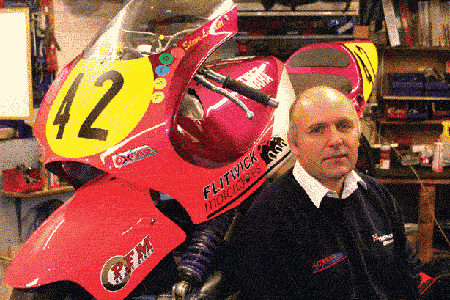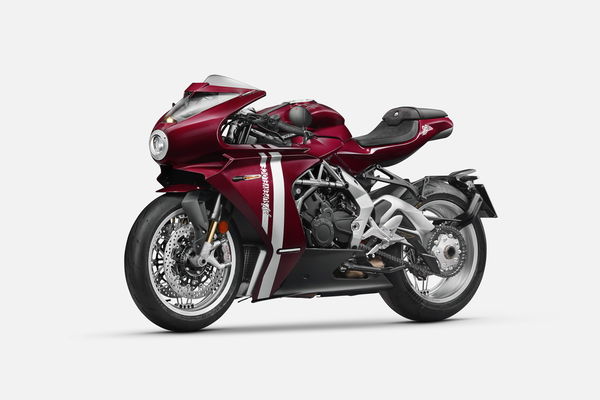10 minutes with Steve Linsdell
More than 20 years in the bike trade as owner of Flitwick Motorcycles
and a veteran TT campaigner on some seriously oddball bikes,
Steve Linsdell tells us how it is, was, and still could be


|
How long have you been in business?
The bike shop started in 1976 and the owner was a friend of mine. He closed the shop down in the sales slump in the early 80s, and I wondered if there was any way I could take the business over. He said, 'Let's talk about it'. So my wife Carole and I took it over from a closed-down business. We'll have been here 21 years in January.
Bike shops large and small have come and gone, so what do you do right?
We try to give a good service - and I think we do. Our philosophy is to treat people how you'd expect to be treated yourself. If you do the core things right you'll always have customers, and we have a good, loyal customer base.
Why take Triumph on after years selling just Yamahas? Blind patriotism?
It was a business decision. Triumph came and did a 'secret shop' here - they sent a rep in and were happy with how they were treated - then asked if we'd sell Triumphs. I was committed to Yamaha at the time, but finding it increasingly difficult to make money to look after our customers selling just Yamahas. Looking after customers costs a lot of money and we were struggling. The typical Japanese dealer network always includes people willing to sell at a very small profit, and that sets the price for the industry. It's a real problem. We all think it's nice to have something cheap but there's a trade-off. I remember when we were selling Yamaha FZR1000 Exups. You could buy a brand new bike then trade it in a year later, add £800 to the trade-in price and have another new bike. You can't do that now. Secondhand values are nothing.
What swung the decision to go for Triumph?
I was a little concerned as we'd had no dealings with Triumph, but I'm 100% happy with the decision. They've helped us in quite a way with our business. Triumphs bring in their own customers; there are Yamaha customers and Triumph customers and you get a few crossing over both ways, but generally they're separate groups of customers. They're two good marques to have; they complement each other well.
What do you think of the bikes Triumph are producing now?
I'm ever so excited about Triumph at the moment, with the new Sprint, which I think is a lovely looking bike - fingers crossed it works as good as it looks - the new Speed Triple and the Rocket III. That in particular has caught people's imagination.
Where do you see the bike industry in the UK going? Is there room for growth?
The potential for growth is there. We're
seeing more bikes with big miles on them now than ever before because more people are commuting by bike to avoid congestion. That's where mainstream motorcycling, for the non-enthusiast, could grow.
Perhaps we should get 'Flitwick Fred' out again. In the early 90s we had this big board on the back of a bike which said, 'I pass queues, I park free, I have fun. Why don't you?' We'd send people out on the bike to find traffic jams and filter through. We were quite good at doing promotional things like that, but we've slipped a little bit.
Winter must be a bad time for selling bikes. How do you survive it?
You know it's going to happen so you have to put a bit of fat on in the summer. There are three profit centres: the workshop, parts and accessories, and bike sales. In our business the three parts are all a similar size and contribute similar amounts. If you rely on bike sales only you'll struggle.
When did your TT career begin?
I did the Manx GP in 1981riding a 1959 Royal Enfield. I finished second in the Newcomers' race with a TZ500 in front and four RG500s behind.Then I did the TT from '86 onwards.
How did your hub-centre steered GTS1000-based wacky racer come about?
Oh, my memory's not so good now... I had an FZ750 for years and ran as high as third in the Formula One. In 1993 I got a YZF750 but it wobbled so badly round the Island that I hated it. Then the hub centre-steered GTS1000 was launched. It was so stable and soaked the bumps up so nice that I thought it would be good at the Island. It all started from there. I think I was eighth first time out, then I got a sixth in the Formula One race in 1996, with five works Hondas in front and then me on my tourer!
Why do you race all the oddball stuff?
I like to be the underdog, but usually I pick something for a good reason.
In 1986 I had a pre-Diversion XJ600, the old 'sit up and beg' one, and finished third in the Production race. That bike also did a six-hour endurance race, some club races, then we sold it to a despatch rider. The last we saw of it, it had 92,000 miles on the clock.
I ran a 955i Daytona in 2002 in the Production TT. It was okay, but with things like GSX-R1000s and R1s out there you're on a hiding to nothing. This year I rode the shop's demo R1. It was absolutely bog stock. We found a problem with the hub-centre steered bike, so I rode the R1 in the Formula One race and went within half a second of my fastest-ever lap without even thinking about it. I couldn't believe it.
What is your fastest lap?
I did a 117.5mph lap on the FZ750. In those days I was pretty competitive, but I like riding the 400 now - I finished second to McGuinness this year in the 400 race. I started with a third in '86, finished this year with a second and I've been on the rostrum 10 times. But that's it, 2004 was my last TT.
I've always tried to minimise the risks. I've raced since 1977, I've been a club champion, had 100 wins on vintage bikes and I've never broken a bone, never spent a night in hospital. Motorcycles have been good to me.











